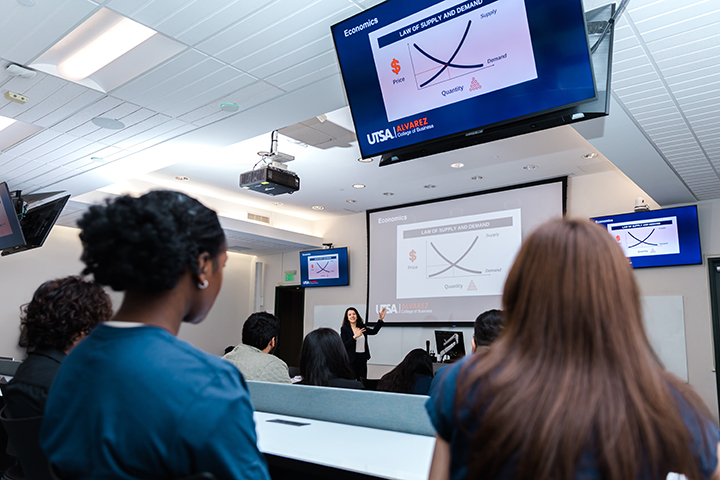Welcome to the Department of Economics at The University of Texas at San Antonio (UTSA). Located in the Carlos Alvarez College of Business, we are a member of the American Society of Hispanic Economists. Striving for excellent teaching and scholarly research accomplishment, our full-time faculty members are well respected in their various research fields.

Department Office
Main Campus, Business Building (BB) , 4.01.10
Monday thru Friday | 8 a.m. to 5 p.m.
210-458-4315

Department Profile
175
Majors
3
Degree Programs
36%
First Gen

MA in Economics Program
Learn state-of-the-art quantitative methods, gain relevant experience with applied analytical tools and graduate with a competitive edge. Earn your master’s degree in economics from the top-ranked business school in San Antonio.

Economics Brown Bag Research Workshops
Attend an upcoming brown bag research workshop to support faculty and doctoral students as they present early-stage research projects to collect feedback.
Latest Economics News
View All News Stories
July 28, 2023
Meet A Roadrunner: Emmanuel CollingwoodPublished by Alvarez College of Business
Meet Emmanuel Collingwood, an undergraduate finance student minoring in economics in the Carlos Alvarez College of Business!

January 31, 2023
Pre-Ph.D. Students Participate in The PhD Project ConferencePublished by Alvarez College of Business
Two UTSA Carlos Alvarez College of Business graduate students attended The PhD Project‘s annual conference in Chicago last year. The participants were Veronica Diaz, a MBA student, and Holly King, ’22 a graduate student in the master’s of economics program. They were two of only 180 students selected to participate nationwide.

June 2, 2022
Two Students Selected to Join Alvarez Fellows Research ProgramPublished by Alvarez College of Business
The Carlos Alvarez College of Business at UTSA has selected two business students to join the Alvarez Fellows Undergraduate Research Program for spring 2022. The new fellows are Shawn Marchand, a junior information systems major, and Luis Nino, a junior economics and finance major.















